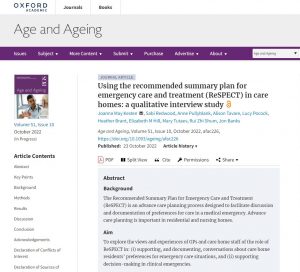Care home staff find the Recommended Summary Plan for Emergency Care and Treatment (ReSPECT) empowers residents
24 October 2022
GPs and care home staff see the Recommended Summary Plan for Emergency Care and Treatment (ReSPECT) as positive and empowering for residents, according to an evaluation carried out by researchers at NIHR ARC West in collaboration with the West of England Academic Health Science Network (AHSN) and published in Age and Ageing.
To assess experiences with ReSPECT, researchers interviewed 16 GPs and 11 care home staff. Interviewees saw ReSPECT as a mostly positive process allowing for broader discussion of residents’ preferences in a range of situations beyond resuscitation. The study team conducted their interviews in care and nursing homes because advance care planning has been identified as particularly relevant in these settings and we know little about how ReSPECT is used there.
ReSPECT was developed in partnership with patients by the UK Resuscitation Council with the aim of encouraging people to have conversations about what medical care they would want in an emergency. The process is designed to support these conversations and results in the completion of a form outlining a person’s wishes along with clinical recommendations.
Although the ReSPECT form includes a section about whether cardiopulmonary resuscitation (CPR) is appropriate, it emphasises the sharing of information about how treatment should be escalated and where a patient would prefer to receive care. ReSPECT was rolled out across the West of England with the support of the West of England AHSN.
Many GPs emphasised the value of having the ReSPECT conversation with residents over the act of filling out the form itself. Following the ReSPECT process allowed them to focus on the person they were working with, and some chose to complete the form after an appointment rather than during it. However, they also highlighted that lack of time could be a potential barrier to engaging in multiple conversations.
Both GPs and care home staff recognised that care home staff usually had good relationships with residents and a good understanding of their care needs. Some care home staff started conversations about ReSPECT with residents. They also provided examples of the process working well and being used effectively to direct emergency care decisions in line with residents’ preferences.
However, some staff recalled that the way forms had been completed wasn’t always clear and they emphasised the need for clear guidance to support translating what residents wanted into action during emergency situations.
The findings from this study highlight that care home staff should potentially be more involved in advance care planning processes. This has implications for each stage of the ReSPECT process and may improve how it is implemented. Adopting a multi-disciplinary approach, particularly involving care home staff, could reduce the demand on GP time. It could also improve how the contents of the ReSPECT form are communicated to other healthcare professionals and care staff in an emergency.
Jon Banks, study lead, said:
“We’re really pleased to have had the opportunity to evaluate the use of the ReSPECT process in care homes. Our paper highlights a number of positive aspects, particularly its inclusivity and the way it gives residents the opportunity to voice their preferences about care in an emergency.
“We also highlight communication difficulties that can arise when health care professionals and care staff use the form during emergencies and suggest strategies to minimise these problems such as adopting a multi-disciplinary approach to completing the ReSPECT form.”
Dr Alison Tavaré, primary care clinical lead at the West of England AHSN, said:
“We were very interested in seeing how ReSPECT was implemented in care homes because its use in such settings is highly relevant due to the age, frailty and co-morbidity of the residents receiving social care outside their own homes.
“We hope that the results of our study shed light on some of the difficulties involved in translating what is written on these forms into the emergency care that residents are subsequently given.”
Paper
